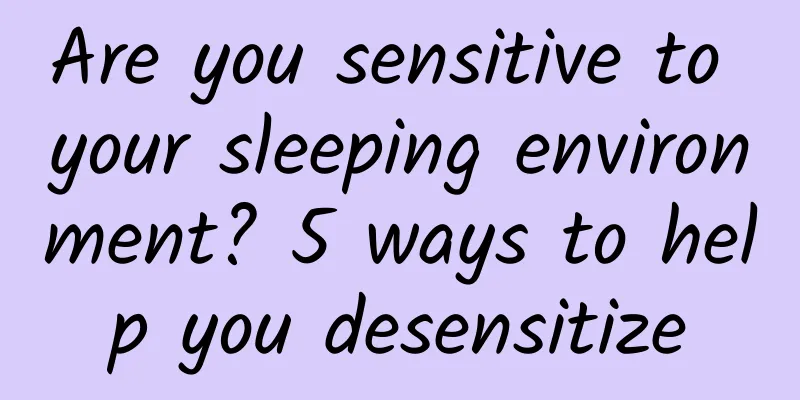Are you sensitive to your sleeping environment? 5 ways to help you desensitize

|
There are many factors that affect sleep, including age, alcohol, cigarettes, caffeine, overwork, and emotions. Some people are extremely sensitive to their sleeping environment. Some people are "stubborn" to their bed, some wake up at the slightest noise, and some people can't sleep all night after changing to a new environment on a business trip... If you are also disturbed by the environment, resulting in poor sleep quality, then this expert science video may inspire you! Faced with sensitive environmental factors, how can we improve our sleep quality? Let us follow the explanation of Jia Fujun, chief physician of the Department of Psychology and Psychiatry of Guangdong Provincial People's Hospital, and get 5 simple and effective ways to improve it! Spend 3 minutes to "unlock" 5 ways to improve What are the sensitive factors of the sleeping environment? There are many factors that may affect the sleep environment, and each person may be different, so you need to find the factors that affect your sleep. For example, noise, temperature, humidity, light, the hardness or comfort of bedding, as well as the environment of the bedroom, the layout of furniture, etc., may all be sensitive factors that cause poor sleep. What should I do if I am sensitive to the sleeping environment? 01 Subjective diversion of attention When faced with sensitive factors that you cannot eliminate, try not to think about them. This way, your attention will not be focused on the interfering factors, and you can minimize the interference. 02 Do some exercise before going to bed Doing some exercise before going to bed can improve sleep quality and help eliminate interference from environmental factors. (Image source: Pexels) 03 Carry out gradual desensitization training If you are disturbed by a certain factor for a long time, you need to carry out gradual desensitization training. For example, if you are disturbed by a certain sound, then in a happy and stress-free state, you can try to actively accept these sounds, and slowly you will become less sensitive to this sound. 04 Actively use psychological cues Through positive psychological suggestion, imagine yourself in a beautiful environment. Imagine yourself in a place that you like, whether it is the temperature or the scenery, and imagine yourself in a beautiful environment, which can also accelerate sleep. (Image source: Pexels) 05 Use short-acting hypnotic drugs If there is really no other way, you can also use some short-acting hypnotic drugs. The general environmental influence has a greater impact on falling asleep. We can take some short-acting hypnotic drugs to help shorten the time to fall asleep and reduce the impact of the environment on you. (Image source: Pexels) The quality of the sleeping environment directly affects a person's sleep quality. If you are sensitive to the sleeping environment, you might as well try the above five methods to self-regulate, help reduce the interference of the environment on sleep, and return to high-quality sleep! |
<<: Why can pigeons return to their homes no matter where they fly?
>>: Would you drink beer if it doesn't have alcohol?
Recommend
The phoenix comes and sings in the sky. Why do Chinese people always regard the phoenix as the bird of love?
Phoenix It is a sacred bird that symbolizes love....
Is winter here? Is winter coming earlier and earlier? | Data Weather Station
After suffering from rounds of cold waves, the te...
Black workers: 90s bees cloned into a million-strong army, almost subverting the South African beekeeping industry
More, more, more. Written by | Krestrel Honey bee...
How much is a pound of Ligustrum lucidum
Fructus Ligustri Lucidi, also known as Ligustrum ...
The movement of particles is certain, so the future world is certain?
© Malte Mueller/Getty Images Leviathan Press: Tho...
The efficacy and function of Fenghe Pear
Maple pear is a kind of traditional Chinese medic...
What diseases does plantain cure
Plantain is a wild vegetable. Nowadays, people li...
How do smartwatches and fitness trackers reveal our mental state?
Planner: Chinese Medical Association Reviewer: Li...
The efficacy and function of the leaves of the oblong-leaved elm
The branches and leaves of the oblong-leaved elm ...
Are you in the right shape for hula hooping? Mathematicians prove it →
Compiled by: Gong Zixin Mechanical systems with m...
The efficacy and function of the coral fruit of the dense hairy peach leaf
The fruit of the dense-haired peach leaf coral is...
Pictures of Gastrodia elata
Gastrodia elata is a perennial endoparasitic herb...
The efficacy and function of Perilla frutescens[Picture]
As for Perilla frutescens [picture], I think some...
What are the characteristics of black wolfberry
Many people have never seen black wolfberry. They...









